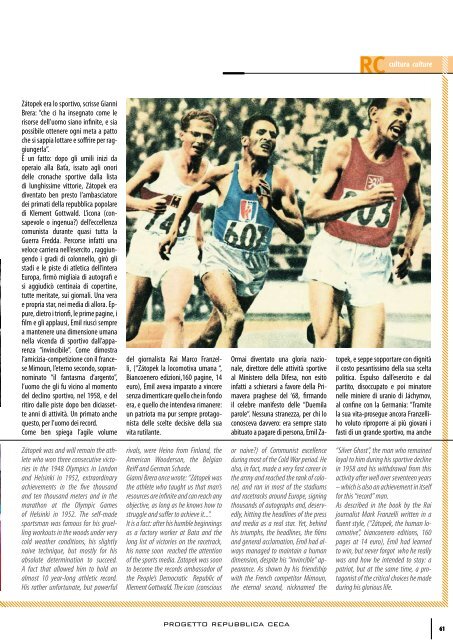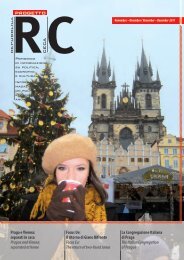Download PDF File - Gruppoibc.Eu
Download PDF File - Gruppoibc.Eu
Download PDF File - Gruppoibc.Eu
You also want an ePaper? Increase the reach of your titles
YUMPU automatically turns print PDFs into web optimized ePapers that Google loves.
Zátopek era lo sportivo, scrisse Gianni<br />
Brera: “che ci ha insegnato come le<br />
risorse dell’uomo siano infinite, e sia<br />
possibile ottenere ogni meta a patto<br />
che si sappia lottare e soffrire per rag‑<br />
giungerla”.<br />
È un fatto: dopo gli umili inizi da<br />
operaio alla Baťa, issato agli onori<br />
delle cronache sportive dalla lista<br />
di lunghissime vittorie, Zátopek era<br />
diventato ben presto l’ambasciatore<br />
dei primati della repubblica popolare<br />
di Klement Gottwald. L’icona (con‑<br />
sapevole o ingenua?) dell’eccellenza<br />
comunista durante quasi tutta la<br />
Guerra Fredda. Percorse infatti una<br />
veloce carriera nell’esercito , raggiun‑<br />
gendo i gradi di colonnello, girò gli<br />
stadi e le piste di atletica dell’intera<br />
<strong>Eu</strong>ropa, firmò migliaia di autografi e<br />
si aggiudicò centinaia di copertine,<br />
tutte meritate, sui giornali. Una vera<br />
e propria star, nei media di allora. Ep‑<br />
pure, dietro i trionfi, le prime pagine, i<br />
film e gli applausi, Emil riuscì sempre<br />
a mantenere una dimensione umana<br />
nella vicenda di sportivo dall’appa‑<br />
renza “invincibile”. Come dimostra<br />
l’amicizia‑competizione con il france‑<br />
se Mimoun, l’eterno secondo, sopran‑<br />
nominato “il fantasma d’argento”,<br />
l’uomo che gli fu vicino al momento<br />
del declino sportivo, nel 1958, e del<br />
ritiro dalle piste dopo ben diciasset‑<br />
te anni di attività. Un primato anche<br />
questo, per l’uomo dei record.<br />
Come ben spiega l’agile volume<br />
Zátopek was and will remain the athlete<br />
who won three consecutive victories<br />
in the 1948 Olympics in London<br />
and Helsinki in 1952, extraordinary<br />
achievements in the five thousand<br />
and ten thousand meters and in the<br />
marathon at the Olympic Games<br />
of Helsinki in 1952. The self-made<br />
sportsman was famous for his gruelling<br />
workouts in the woods under very<br />
cold weather conditions, his slightly<br />
naive technique, but mostly for his<br />
absolute determination to succeed.<br />
A fact that allowed him to hold an<br />
almost 10 year-long athletic record.<br />
His rather unfortunate, but powerful<br />
del giornalista Rai Marco Franzel‑<br />
li, (“Zátopek la locomotiva umana “,<br />
Biancoenero edizioni,160 pagine, 14<br />
euro), Emil aveva imparato a vincere<br />
senza dimenticare quello che in fondo<br />
era, e quello che intendeva rimanere:<br />
un patriota ma pur sempre protago‑<br />
nista delle scelte decisive della sua<br />
vita rutilante.<br />
rivals, were Heino from Finland, the<br />
American Wooderson, the Belgian<br />
Reiff and German Schade.<br />
Gianni Brera once wrote: “Zátopek was<br />
the athlete who taught us that man’s<br />
resources are infinite and can reach any<br />
objective, as long as he knows how to<br />
struggle and suffer to achieve it...”.<br />
It is a fact: after his humble beginnings<br />
as a factory worker at Bata and the<br />
long list of victories on the racetrack,<br />
his name soon reached the attention<br />
of the sports media. Zatopek was soon<br />
to become the records ambassador of<br />
the People’s Democratic Republic of<br />
Klement Gottwald. The icon (conscious<br />
Ormai diventato una gloria nazio‑<br />
nale, direttore delle attività sportive<br />
al Ministero della Difesa, non esitò<br />
infatti a schierarsi a favore della Pri‑<br />
mavera praghese del ‘68, firmando<br />
il celebre manifesto delle “Duemila<br />
parole“. Nessuna stranezza, per chi lo<br />
conosceva davvero: era sempre stato<br />
abituato a pagare di persona, Emil Za‑<br />
or naive?) of Communist excellence<br />
during most of the Cold War period. He<br />
also, in fact, made a very fast career in<br />
the army and reached the rank of colonel,<br />
and ran in most of the stadiums<br />
and racetracks around <strong>Eu</strong>rope, signing<br />
thousands of autographs and, deservedly,<br />
hitting the headlines of the press<br />
and media as a real star. Yet, behind<br />
his triumphs, the headlines, the films<br />
and general acclamation, Emil had always<br />
managed to maintain a human<br />
dimension, despite his “invincible” appearance.<br />
As shown by his friendship<br />
with the French competitor Mimoun,<br />
the eternal second, nicknamed the<br />
progetto repubblica ceca<br />
cultura culture<br />
topek, e seppe sopportare con dignità<br />
il costo pesantissimo della sua scelta<br />
politica. Espulso dall’esercito e dal<br />
partito, disoccupato e poi minatore<br />
nelle miniere di uranio di Jáchymov,<br />
al confine con la Germania: “Tramite<br />
la sua vita‑prosegue ancora Franzelli‑<br />
ho voluto riproporre ai più giovani i<br />
fasti di un grande sportivo, ma anche<br />
“Silver Ghost”, the man who remained<br />
loyal to him during his sportive decline<br />
in 1958 and his withdrawal from this<br />
activity after well over seventeen years<br />
– which is also an achievement in itself<br />
for this “record” man.<br />
As described in the book by the Rai<br />
journalist Mark Franzelli written in a<br />
fluent style, (“Zátopek, the human locomotive”,<br />
biancoenero editions, 160<br />
pages at 14 euro), Emil had learned<br />
to win, but never forgot who he really<br />
was and how he intended to stay: a<br />
patriot, but at the same time, a protagonist<br />
of the critical choices he made<br />
during his glorious life.<br />
61



